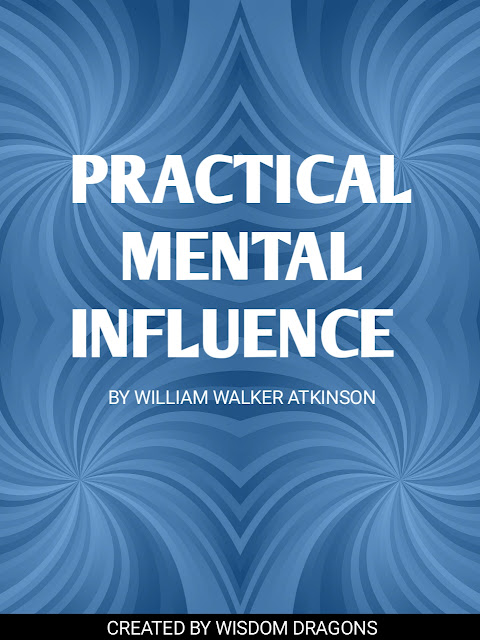YOUR MIND AND HOW TO USE IT/PART 4
CHAPTER IV.
Consciousness.
THE
fact of consciousness is the great mystery of psychology. It is difficult even
to define the term, although every person of average intelligence understands
what is sought to be conveyed by it. Webster defines it as "knowledge of
one's own existence, sensations, mental operations, etc.; immediate knowledge
or perception of any object, state, or sensation; being aware; being sensible
of." Another authority defines the term as "the state of being aware
of one's sensations; the power, faculty, or mental state of being aware of
one's own existence, condition at the moment, thoughts, feelings, and
actions." Halleck's definition is: "That indefinable characteristic
of mental states which causes us to be aware of them."
It
will be seen that the idea of "awareness" is the essence of the idea
of consciousness. But, at the last, we are compelled to acknowledge that it is
impossible to closely define consciousness, for it is something so entirely
unique and different from anything else that we have no other terms at all
synonymous to it. We can define it only in its own terms, as will be seen
by reference to the definitions above given. And it is equally impossible
to clearly account for its appearance and being. Huxley has well said:
"How it is that anything so remarkable as a state of consciousness comes
about by the result of irritating nervous tissue, is just as unaccountable as
the appearance of the jinnee when Aladdin rubbed his lamp." All that we
can ever know regarding the nature of consciousness must be learned from
turning the consciousness in ourselves back upon itself—by focusing
consciousness upon its own mental operations by means of introspection. By
turning inward the conscious gaze we may perceive the flow of the stream of
thought from its rise from the subconscious regions of the mind to its final
disappearance in the same region.
It
is a common error to suppose that we are directly conscious of objects outside
of ourselves. This is impossible, for there is no direct knowledge of such
outside objects. We are conscious merely of our sensations of, or mental images
of, the outside objects. All that it is possible for us to be directly
conscious of are our own mental experiences or states. We cannot be directly conscious
of anything outside of our own minds. We are not directly conscious of the tree
which we see; we are directly conscious merely of the sensation of
the nerves arising from the impact of the light waves carrying the image of the
tree. We are not directly conscious of the tree when we touch it and perceive
its character in that way; we are directly conscious merely of the sensation
reported by the nerves in the finger tips which have come in contact with the
tree. We are directly conscious even of our own bodies only in the same way. It
is necessary for the mind to experience that of which it may become conscious.
We are conscious only of (1) that which our mind is experiencing at this
moment, or (2) that which it has experienced in the past, and which is being
re-experienced this moment by the process of the memory, or which is being
re-combined or re-arranged this moment by the imagination.
Subconscious
Planes.
But
it must not be thought that every mental state or mental fact is in the field
of consciousness. This error has been exploded for many years. The fact is now
recognized that the field of consciousness is a very narrow and limited one,
and that the great field of mental activity lies outside of its narrow limits.
Beyond and outside of the narrow field of consciousness lies the great
subconscious storehouse of memory in which are stored the experiences of the
past, to be drawn again into the field of consciousness by an effort of the
will in the act of recollection, or by association in ordinary remembrance.
In that great region, also, the mind manifests many of its activities and
performs much of its work. In that great region are evolved the emotions and
feelings which play such an important part in our lives, and which often
manifest a vague disturbing unrest long before they rise to the plane of
consciousness. In that great region are produced the ideas, feelings, and
conceptions which arise to the plane of consciousness and manifest that which
men call "genius."
On
the subconscious plane the imagination does much of its work, and startles its
owner by presenting him with the accomplished result in the field of
consciousness. In the subconscious field is performed that peculiar process of
mental mastication, digestion, and assimilation with which all brain workers
are familiar, and which absorbs the raw mental material given it, separates,
digests, and assimilates it, and re-presents it to the conscious faculties
sometime after as a transformed substance. It has been estimated that at least
eighty-five per cent. of our mental activities are performed below or outside
of the field of consciousness. The psychology of to-day is paying much
attention to this formerly neglected great area or areas of the mind. The
psychology of to-morrow will pay still greater attention to it.
The
best of the modern authorities agree that in the great field of subconscious
mentation is to be found the explanation of much that is unexplainable
otherwise. In fact, it is probable that before long consciousness will be
regarded as a mere focusing of attention upon mental states,
and the objects of consciousness merely as that portion of the contents of the
mind in the field of mental vision created by such focusing.



Comments
Post a Comment